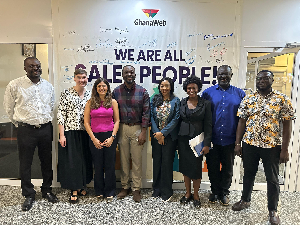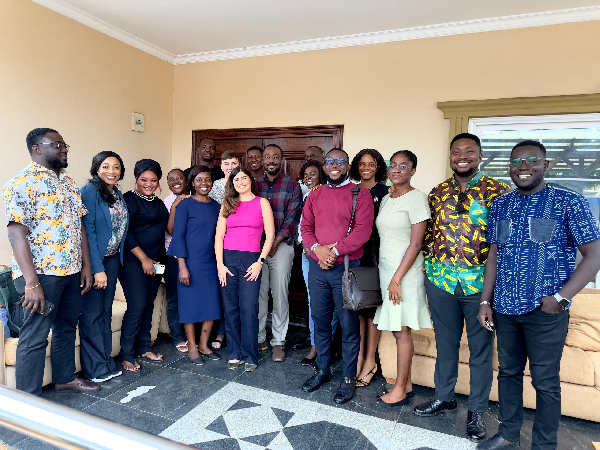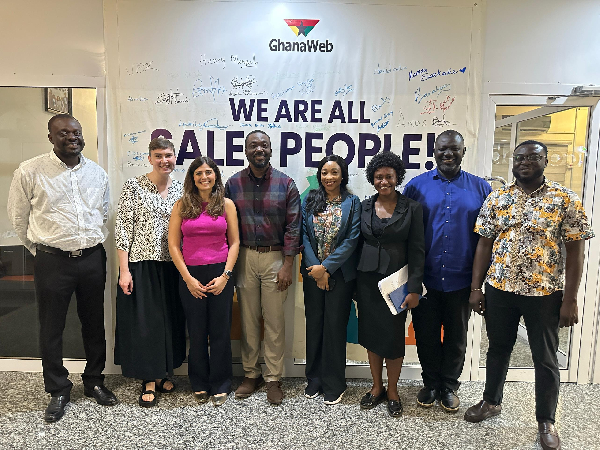 The BBC team with the GhanaWeb management when they visited
The BBC team with the GhanaWeb management when they visited
A team from the BBC has visited Ghana’s leading news website, GhanaWeb, to share ideas specifically relating to podcasting generations and how it is relevant to today’s media.
The team of three met with the editorial news team for what was nearly two hours of sharing experiences and ideas on how to produce world-class podcasts, as well as how to maximise the era of podcasting to project media brands.
As part of the discussions, the BBC team shared relatable stories of their experiences in countries across the world, including on topics such as the best ways to identify a good podcast subject to work on.
The team explained that one of the ways they, at the BBC, arrive at the best ideas for a podcast, includes social listening tools, and employing the use of narrative storytelling, with a primary focus on collecting data.
“What we try to do is find stories that apply to people around the world and then look for local stories that fit into that… When we were in Malaysia last year, we spoke to people on overconsumption and shopping addiction.
“So, we are talking to people and we had a guy who has like 300 pairs of shoes – he is obsessed, but the question is do you need these numbers of shoes? But there will be people all over the world who can identify with that and say, ‘Oh, I’ve spent money that I don’t really have because I’ve been watching things on the internet,’” BBC Assistant Editor, Verity Wilde, said in reference to how to identify the right subjects for podcasts.
Adding to it, Hannah Gelbart, an award-winning podcast host, presenter, and investigative journalist at BBC News, also expanded on how they have followed that story to places like the beaches of Ghana.
“And then this morning, we got up at 5 in the morning, to go to the Ussher Fort Beach where there was a cleanup where we got to see where some of those 300 pairs of trainers might end up, and actually, it was really upsetting to see where all of the waste that is coming in from Europe, from America.
“And we went to Kantamanto and we looked at the amazing work of people trying to clean the clothes and sew it and make new things and they said that 40% of the stuff that come their way is absolute rubbish and that’s what goes into the dumpsites, goes into the lagoons and ends up in beautiful city beaches,” she added.
Also, they explained that telling stories are important because of the people directly affected by them.
The BBC team also answered questions from the GhanaWeb team on such things as ‘Can anybody start a podcast?’ and ‘How to monetise a podcast efficiently and effectively.’

Following the session with the editorial team, the BBC team met with the Management of GhanaWeb, during which they pledged the BBC’s continuous support through periodic training programmes aimed at building journalistic capacity and promoting ethical, high-standard reporting styles.
The Chief Executive Officer of GhanaWeb, David Antwi, in his brief remarks said, “We are honoured to host the BBC team at GhanaWeb. This is the biggest news website in Ghana and to partner with a global powerhouse like the BBC is a reaffirmation of the growing global interest in Ghana’s digital media landscape.”
He further added that; “It was a valuable opportunity to exchange ideas on innovation, content development, and the future of journalism in Ghana and in Africa as a whole.”
The BBC team was made up of Assistant Editor Verity Wilde; Hannah Gelbart, host of BBC’s What in the World podcast; and Senior Business Development Associate for South and West Africa, Olajumoke Adebisi.
Cheque Fraud EXPOSED: How it works and how to stay safe
Watch the latest episode of Health Focus below:
AE


